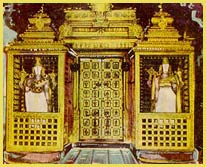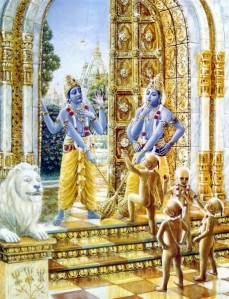Mahabharat is roughly understood to mean ‘the story of the clan of Bharat’. India is called Bharat by Indians in the honour of the great King Bharat. Vyas, however, had called this body of work Jaya. Jaya explored the nature of morality and what it means to be human. Mahabharat is just one of a 60 part series that Vyas had narrated. The other 59 are lost.
Although Jaya and Vijaya, both mean victory, they both represent very different kind of victories. Vijaya is the victory over material things, adversaries, external situations. Vijaya always leads to a situation when one person wins and the other loses, it’s a 0 sum game. Whereas Jaya means victory over self. Jaya leads to victory for everyone, it leads to a more just society. We find Yuddhishthir contemplating on the nature of Jaya and Vijaya when the war is over and he finds peace only when he fully understand that Jaya is far superior to Vijaya. MB/Jaya is therefore not the story of a war rather the futility of war. It is about how morality is a subtle art. It is a moving treatise on conquering the self before one decides to conquer the world or how even conquering the world will not bring one any peace and happiness unless The Self is won. More on this later.
But like all Hindu philosophy, this bit of philosophy comes in the form of a story. It is said that Jaya and Vijaya were the divine guards at the gate of Vaikuntha Dhaam, the celestial abode of Vishnu. Once the Sanat Kumars (sages portrayed as 4 little boys) wanted to meet with Vishnu but Jaya and Vijaya repeatedly stopped them from going in. Incensed at the repeated insult, the Sanat Kumars told them that Vishnu was always available to meet His devotees and cursed Jaya and Vijaya to forever be antagonized with their Lord whom they were guarding so diligently. The curse meant that Jaya and Vijaya would forever be on the side opposed to Vishnu. Lord Vishnu gets to know what happened and realizing that it was no one’s fault apologized to the Sanat Kumars on the behalf of his guards. But the curse had been spoken so Vishnu resolves to take Avatars to redeem Jaya and Vijaya in each of their births. He offers to Jaya and Vijaya two choices one of taking seven births on earth and live out their lives in the same miseries and happiness as all humans or second to take only 3 births each as the enemies of Vishnu and to be delivered by Him at the end of their time. To everyone’s surprise Jaya and Vijaya chose the second option. Their logic? One: This would mean fewer births, and second and more importantly even enimity is a relationship that involves and consumes both parties. Jaya and Vijaya replied “It is better O Lord to perhaps be connected with you even if this be the means rather than to not know you at all. If we can’t be related to you in any other way but this, then we will take this too for atleast in this manner, you will constantly think of us. Everyone who is born has to die and what better way to go than to be relieved of the earthly existence by You, our Lord”. It is to be noted however that to “be delivered by a God or a Goddess” is not considered the same as any other killing in Hinduism. For one, the bad guys are not killed, they merely move from one plane of reality to another. They are mostly asurs or danavs who let their own baser instincts get the better of them. Since everyone has to die, by being delivered by the hands of a God or Goddess they are supposed to forever be relieved of the endless cycle of births and rebirths. Their ‘sacrifice’ is also seen as serving the need to establish lessons for other human beings. In most cases they know what is coming their way and placidly accept it when it does. I guess that’s also the reason why Hinduism takes a surprisingly kind view of its mythological villians. The most prominent of these examples I think is Ravana. Ravana (mentioned above) was the king of Lanka and the sworn enemy of Ram. Scriptures say that he was also a very intelligent man, a very capable ruler, a great devotee of Shiva and perhaps much stronger than Ram. He is still respected in Hinduism as a very capable man and a sad example of what can happen if you take just one unwise decision in life. The Shiva Tandav Strotam (a very moving poem on the glory of Shiv) is said to have been written by Ravana in the honour of Shiv and Parvati. Towards the end of the Shiv Tandav Strotam, Ravana in a very touching manner asks Shiv when his miseries will come to an end. Why is a man who rules over a city of gold be unhappy? Why indeed when he is widely respected as the most powerful and intelligent king in the world, has a very beautiful and wise wife and everything that someone could ever want? Perhaps what he is looking for is far greater than what he has in the material world, maybe he is looking for redemption.
The legend of Jaya and Vijaya is thematically the same as the legend of Lucifer I think (maybe my christian friends could correct me if I am wrong, the fallen angel), and reflects the idea of those who for some reason have forgotten about their divine origins. Therefore Jaya and Vijaya manifest as the ‘bad guys’ in 4 of Vishnu Avatars. When Jaya was Hiranyaksha, Vishnu redeemed him as Varahavatar. When Vijaya was Hiranyakashyap, Vishnu came to him as Narsingh. When Vishnu was Ram, Jaya and Vijaya were Ravana and Kumbhakaran. When Krishna was born they were Dantavakra and Shishupal.
Another legend associates Jaya and Vijaya as the ladies in waiting to Parvati, Vishnu’s little sister and a very powerful Goddess in her own right.

